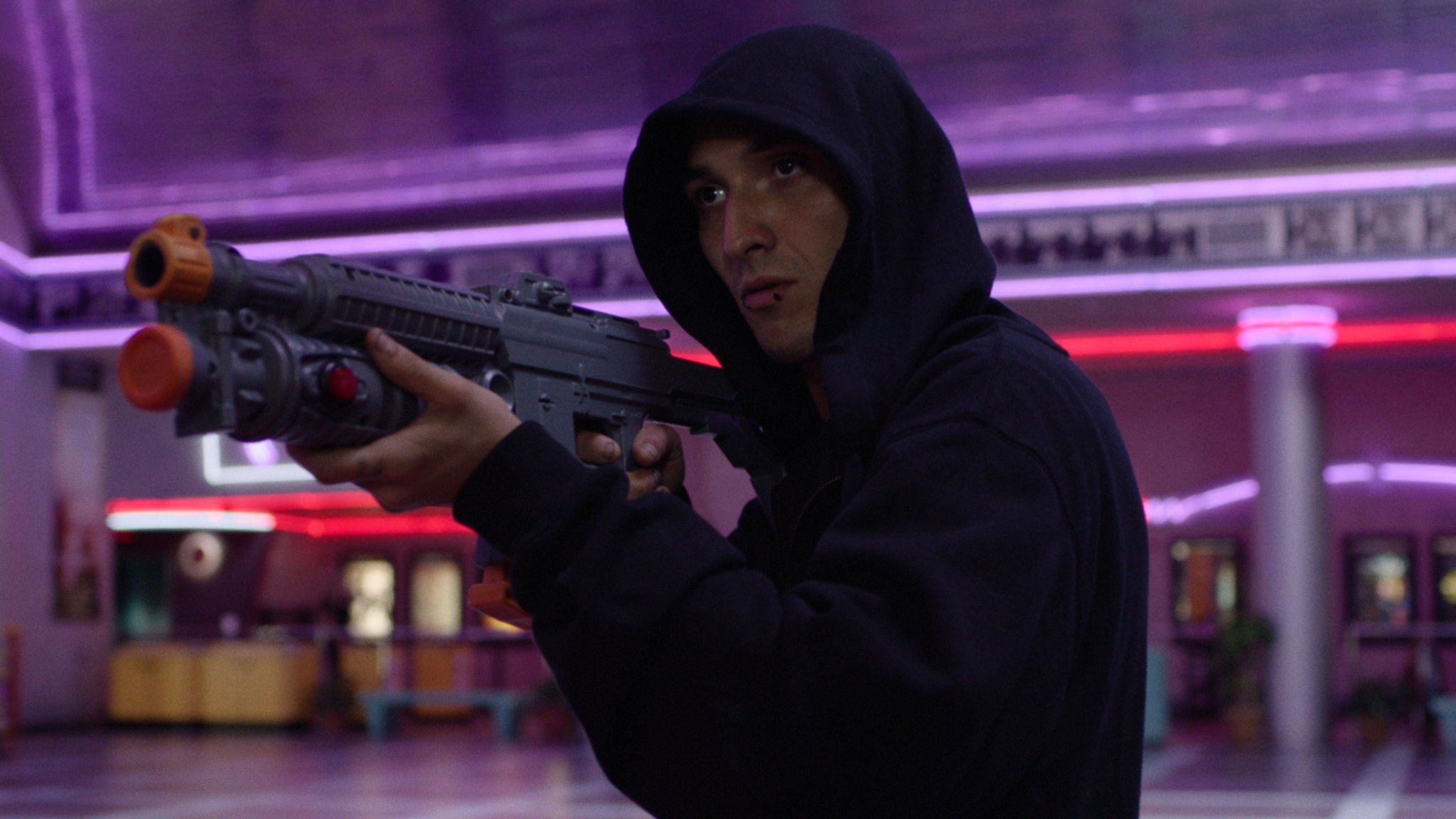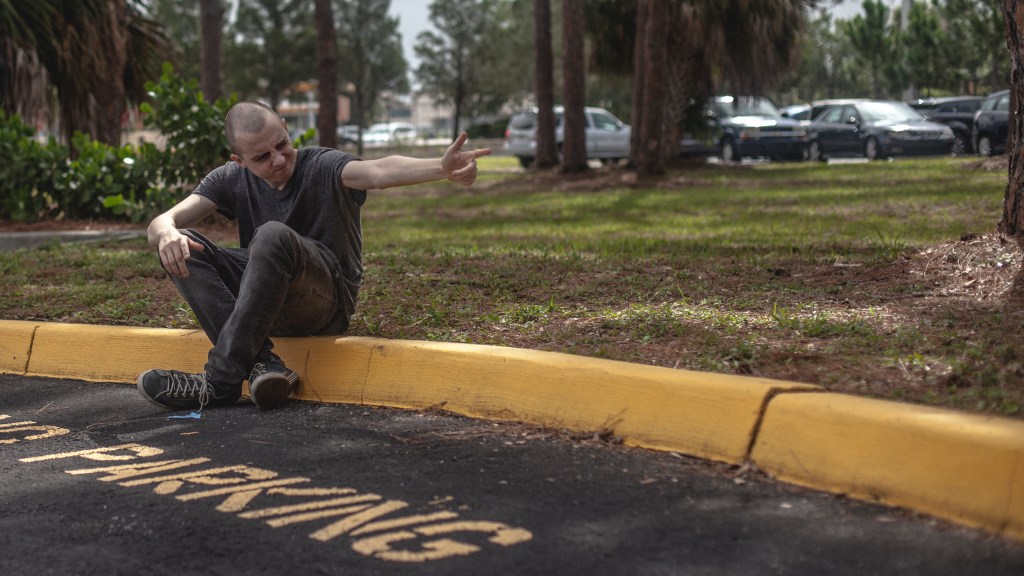Tim Sutton, whose career began in 2012 with festival-favorite Pavilion, has a brand of filmmaking that’s often been compared to the works of Gus Van Sant and Terence Malick—immaculately shot, poetically discursive adventures that find their beauty in existing from moment to moment. He expands on this aesthetic with his third feature Dark Night, which is loosely based on the Aurora shooting from the summer of 2012. Reentering the headspace of James Holmes, who walked into a midnight premiere of Christopher Nolan’s The Dark Knight Rises and killed a dozen people along with wounding 58 more, Sutton insists that he “didn’t want to make a movie about violence,” instead claiming that “I wanted to make a movie about the fragility of life.”
Inside that visceral depiction of fragility is a movie that polarized audience at its 2015 Sundance premiere. The film, which is seeing release through Cinelicious Pics, won’t be playing in a multiplex anytime soon. Understandably, Sutton is frustrated by Hollywood’s unwavering aversion to risk: Throughout our conversation, he voiced his discontentment on what he believes is a “marketplace that has turned its back on films like this.” He’s admirably passionate on this matter. We also discuss his egalitarian approach to presenting a mass murder and how it took him two decades to discover what he wanted to dedicate his life to.
Videos by VICE
VICE: What’s the elevator pitch for Dark Night?
Tim Sutton: We follow six people who end up in the theater—the shooter included. As the sun sets, we realize that the sun will never rise again for these people. We’re stuck in the movie theater with them, thinking, What if it were us?
Two investors came in and were going to make it at a decent budget, but they both walked away at different times because they wanted the shooter to be more traditionally evil. I don’t think a lot of these people are what we would consider traditionally evil. I think they’re disturbed, isolated, hurt, and are seeing the world from a completely different perspective. I’m not saying the shooter is innocent in any way—he does unspeakable acts—but he’s a human being, so his screen time is equal to other people’s screen time.
So you’re OK with humanizing all parties of this equation?
Yeah, because they’re all human. What they do is very different, but we’re all people, and we’re all products of society.
Did you ever consider making the shooter more villainous in an attempt to achieve commercial success?
There’s a huge risk in thinking in those terms. It could completely backfire, and then you’re glorifying the shooter, who people are equating with James Holmes or other shooters in real life. All of the sudden, you’re an even worse guy for making the villain a dramatic, watchable character.
That makes it sound like they’re starting with the assumption that you’re a bad guy.
Well, I’m not a bad guy, but there are some people out there that are upset that the film exists, and I’ve been in contact with some people. When you make a film like this, what’s important is that people see the film before they make judgment, which is hard in the world of Twitter and Facebook.

When I re-watched the film, it’s hypnotic but it’s also initially pretty disorienting.
You don’t experience life in terms of the more traditional structures of film language—so there’s no need to shoot an empty room, have a character walk into the empty room, and have the character leave the room. All you need is one moment that gets enough information across to put you in the present moment.
After the film played at Sundance, what were you feeling?
I thought it was a slam dunk, to be honest. It premiered at Sundance to a lot of hype, and it completely delivered as far as I’m concerned. It created a different kind of audience at Sundance in terms of utter silence and focus, and it delivered a powerful, emotional message. A year later, the film is just getting released. You can imagine how frustrating, disappointing, maddening, and sad that fact is. It should’ve been bought for a lot of money, and it should’ve been played in theaters nationwide.
What was the dialogue like with the distributors?
The majority of the distributors love the film, but it’s just not something that they’re going to take on. Nobody said it’s because they’re afraid of copycat killings—they just don’t think the movie is going to bring them a return on their investments.
How do you feel as an artist moving forward?
I’ve made three very unique, meaningful art films, and I’ve made nothing financially. [I made] a little bit of money from Memphis because we got a grant and didn’t have to pay it back. I’ve made films that people say they love, but they haven’t made an impact on audiences outside of a very small niche. That’s frustrating.
How is it financially sustainable to continue with your career?
I have to get paid to make the next one. I can’t just get my producers together, take it all on our shoulders, and shoot a film with half the budget just for the project’s sake. I have to raise a proper budget and salary. But Dark Night has helped me get involved in the industry in ways that I hadn’t been before—writing adaptations, doing script polishing, and hopefully directing larger-budget films as well.
Listen, I used to live in a big apartment. I don’t live in a big apartment. We downsized. It’s not the easiest lifestyle, but I finally recognize this: At 25, I thought I was going to be a great filmmaker. But it took me 22 years to figure out what I’m actually good at—what I want to continue dedicating my life to—and that’s making meaningful cinema. If I can be a sustainable filmmaker, I’ll continue to make films that I feel have meaning. But it’s not easy. It’s a scramble. It’s a hustle.
Dark Night opens at the Alamo Drafthouse in Brooklyn on Friday, February 3; Los Angeles, February 9.
Follow Sam Fragoso on Twitter.
More
From VICE
-

Collage by VICE -

Collage by VICE -

(Photo by FABRICE COFFRINI/AFP via Getty Images) -

Screenshots: Valve, Warner Bros. Games
